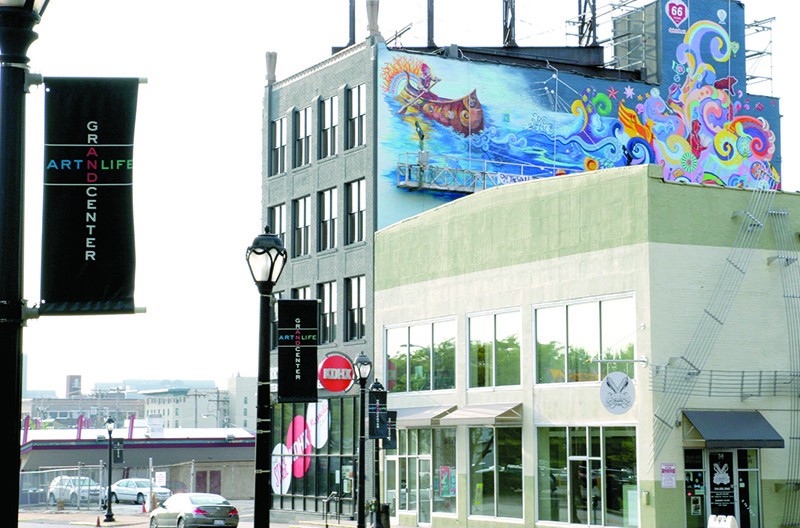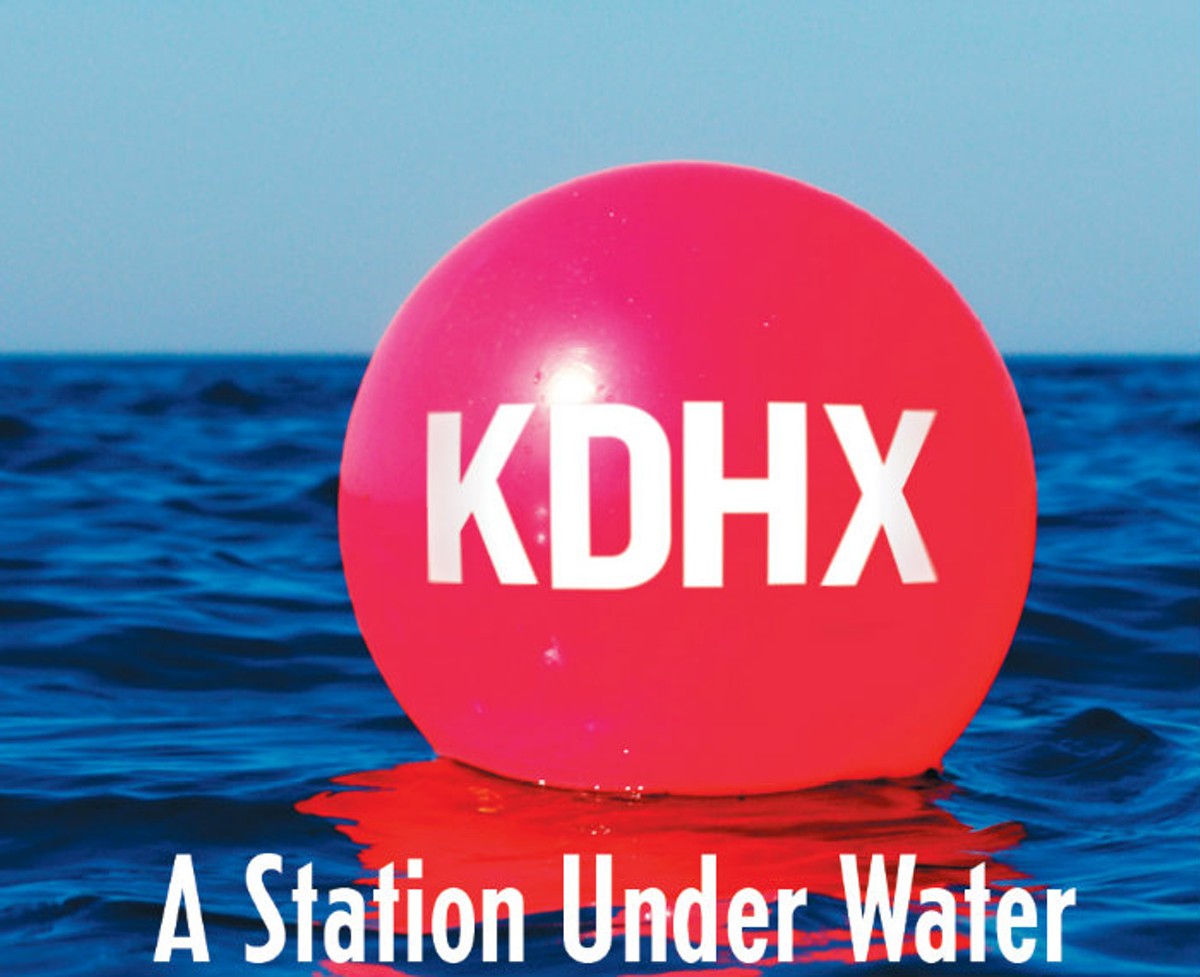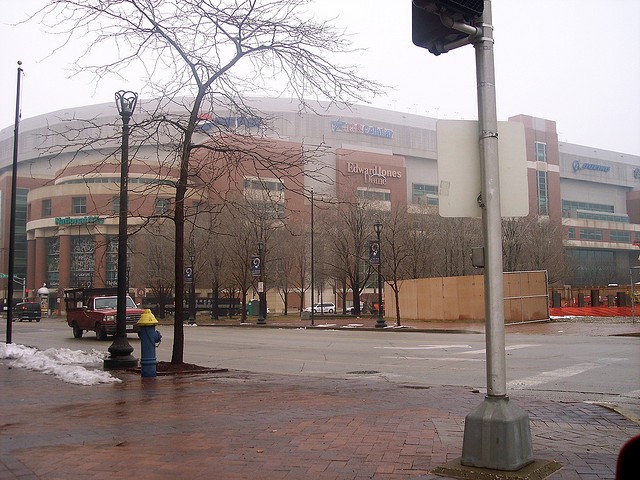
Following a ten-second moment of silence in "honor and remembrance of the victims of September 11, 2001," Mayor Slay dives right in to Phillips 66's newly launched ad campaign — "66 Reasons to Love St. Louis."
"So. Sixty-six Reasons to Love St. Louis!" he begins. "Well, I think I could come up with a whole lot more, but this is a fun and creative way for business to support our community and create a beautiful public art installation."
The oil company paid $20,000 to the father-daughter artist duo of Robert and Liza Fishbone, who painted the mural. Another $20,000 went to the "Music at the Intersection" series, for which KDHX was a partner, but Hacker insists that every dollar went toward "staging and sound systems and street closings and all the logistical stuff. And a whole lot of advertising — there were billboards all over town. None of that money came to KDHX."
The only compensation the station received, then, came from its work helping to curate the actual "66 Reasons" list of St. Louis landmarks, in addition to rounding up local artists to contribute to a Soundcloud playlist for additional promotion. KDHX was paid $2,500 for that work.
While the campaign generated plenty of good headlines for Phillips 66, for KDHX it was more of a mixed bag. Some in the community viewed its mostly unpaid participation as a missed opportunity for much-needed financial help. Others decried any relationship with the oil giant as contradictory to KDHX's status as an "independent" organization.
See also: New Mural Comes from an Unexpected Partner: Phillips 66Hacker, who approved the deal, views the criticism with some bemusement.
"I think it is really really funny, all the controversy about the mural, because one of the things that KDHX has always been incredibly committed to is getting artists paid," she says. "And the people that got paid for the mural were the artists."
Chris Baricevic takes issue with that.
The head of locally based Big Muddy Records was a friend and bandmate to KDHX's beloved Bob Reuter. His label is home to Bob Reuter's Alley Ghost, Reuter's band at the time of his death.
"I'm definitely for artists getting paid," he says over coffee at the Mud House on Cherokee Street. "However, I think that KDHX needs to be working on building a community that can support local artists without having to invite in outside corporations that have international interests. I mean, if she's talking about the artists that actually painted the mural, then she's talking about very few people. And again, that's cool that they got some money, for sure. But they got some money putting a big red, white and black '66' on the side of an arts program building."
In addition, Baricevic says, two of the bands on Big Muddy's roster had their music used for the "66 Reasons" campaign without receiving compensation of any kind. KDHX enlisted their participation without first divulging that the campaign was related to Phillips 66. The Rum Drum Ramblers and the Loot Rock Gang, both of which feature the work of local guitarist Mat Wilson, entered into an open-ended contract under what Baricevic considers to be deceptive circumstances. (Wilson declined to comment for this story, directing questions instead to Baricevic.)
"Mat received an email [from KDHX] asking him to be involved in the '66 Reasons to Love St. Louis' campaign. The email was kind of vague and left out a lot of details," Baricevic says. "I can corroborate this because I received the same email for Alley Ghost. ... Mat just kind of understood it as, 'This is a KDHX thing — sure, well, we'd be happy to help out.' Mat has been a huge supporter of KDHX. So he agreed and signed the paperwork.
"After the campaign had started he found out that this is actually a Phillips 66 campaign. He went back and checked the correspondence and learned that that information was not presented to him. The information was included on the contract, insofar as the header of the contract said 'Phillips 66' and they were mentioned as an 'interested party.' But if you are an artist that is not versed in contracts, that stuff all looks like Greek."
Wilson wasn't the only local artist to sign on the dotted line based solely on faith in the station's good intentions. Melinda Cooper of the band Town Cars also received a release and signed it.
"We always do things for KDHX, so I thought, 'Oh, this is from someone I trust,'" she explains. It wasn't until later that she realized that the oil company was involved. "It was really upsetting."
But that association wasn't even the most egregious aspect of the agreement, Baricevic says.
"The contract itself was written very poorly and in vague enough terms that by signing it and returning it they actually were giving these companies license to use their entire catalog, for no compensation," he explains.
Baricevic and Wilson were able to secure an attorney through St. Louis-based Volunteer Lawyers and Accountants for the Arts. She sent a cease-and-desist letter and ultimately got the contract dissolved — but not before songs from each of Wilson's bands were used in promo videos for the oil company's ad campaign.
Matt Harnish, guitarist/vocalist of St. Louis' Bunnygrunt, recognized early on that the contract did not work in the favor of artists — it failed to list a specific track or to specify a time frame for use. He declined to sign.
"Then we showed up on the playlist anyway," he says. "I was getting ready to send a complaint when I noticed that we just as quickly got removed. Unfortunately the playlist had already been sent off to the advertising agency and we ended up getting used in one of the clips. Without our permission. Because KDHX sent them our music without our permission. A station that had always been a force promoting St. Louis music, and had always been about the little guy going up against the big guy, gave our music away. For free. To the big guy!"
He adds, "I don't think it was done maliciously, and I won't flatter myself to think that we were singled out at all, but it was a cavalcade of incompetence from the get-go, and our song is still out there tied to some dumbass ad campaign, and will be forever. And it's KDHX's fault. And that sucks."
"The bigger issue is that we as a creative community feel like KDHX has just kind of turned their back on us, the community that has built KDHX to be what it is," Baricevic says. "Not necessarily our generation, but the generations that have come before us, of people like us. And this is supposed to be an organization that is part of our community, that's helping our community, and they've recently kind of taken more of a sleek, profit-driven marketability approach that kind of leaves us in the dust."







